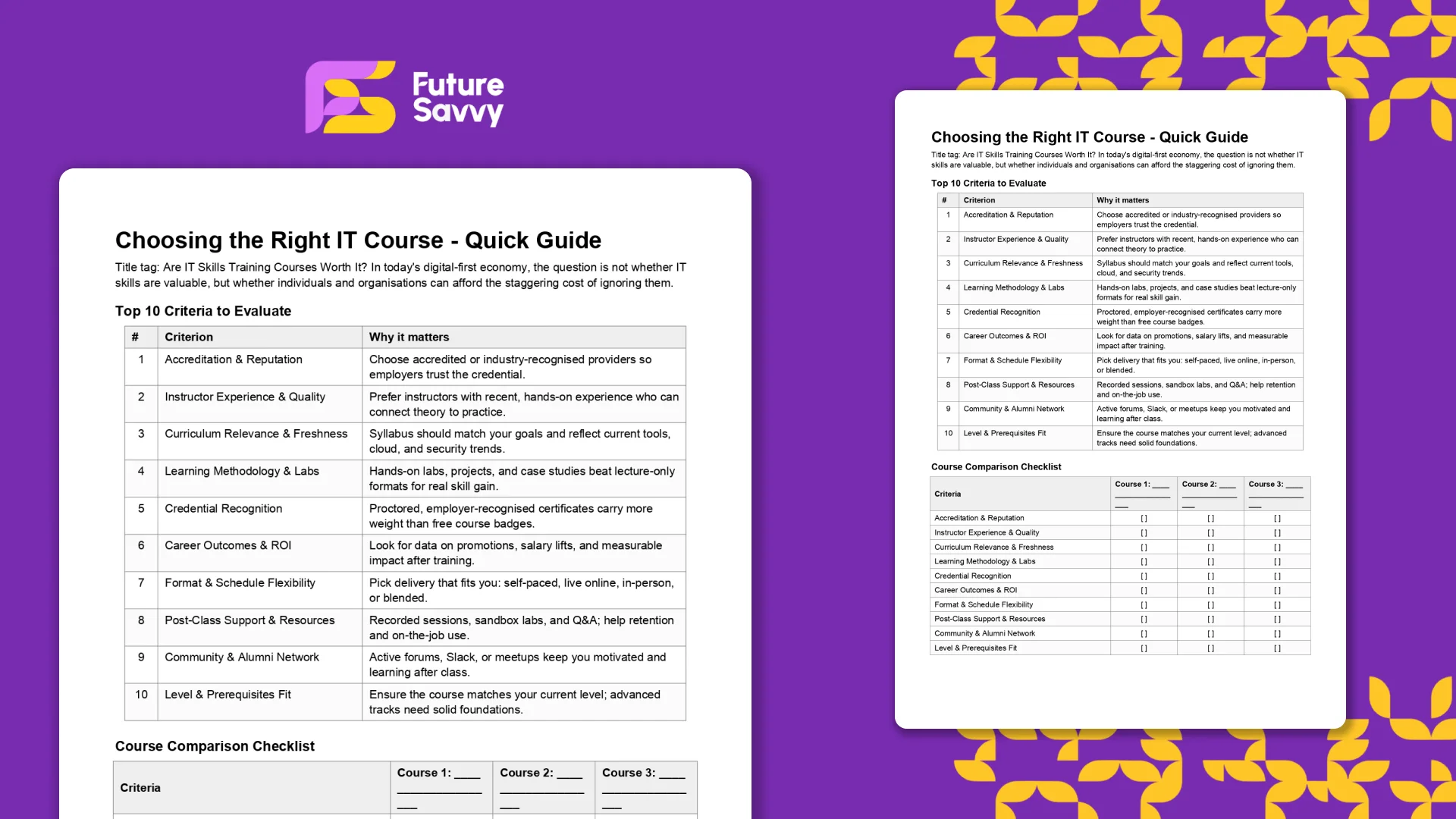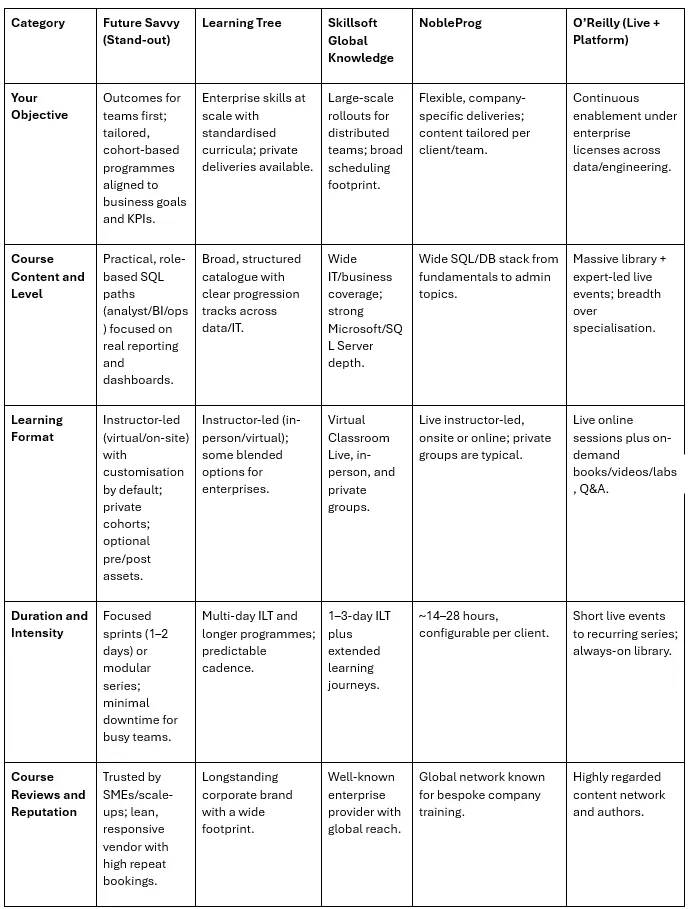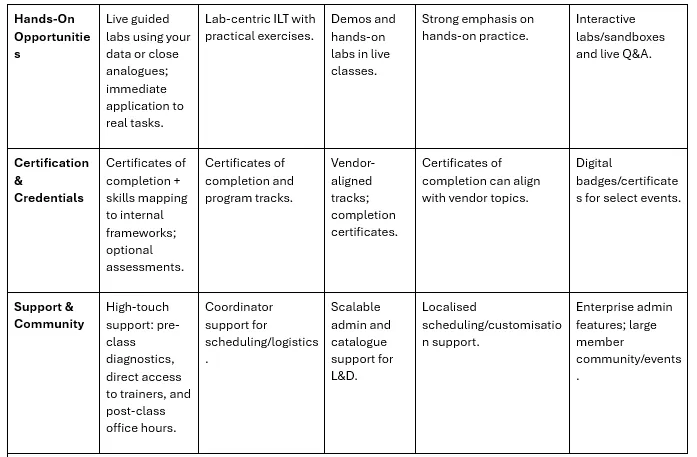- L&D INSIGHTS/
- Basic vs. Advanced SQL Training Courses: What is the difference?/


Basic vs. Advanced SQL Training Courses: What is the difference?
- L&D INSIGHTS/
- Basic vs. Advanced SQL Training Courses: What is the difference?/
Basic vs. Advanced SQL Training Courses: What is the difference?
Far from being a relic, Structured Query Language (SQL) remains an important language for data and a skill that underpins the operations of many modern enterprises. Many professionals still use SQL to store, manage, retrieve, and manipulate this data, transforming raw information into actionable intelligence. This article will explore Basic vs Advanced SQL training courses, their similarities, differences and how to pick the one that best responds to your professional and learning needs.
Overview of SQL Training Courses
SQL training courses come in many formats and levels, catering to everyone from absolute beginners to experienced professionals. So, what are the differences between basic and advanced SQL training courses?
Basic SQL Training Courses
These courses typically assume little to no prior knowledge. These courses start with core concepts – how databases work, writing simple queries – and gradually build up to slightly more complex tasks. The focus is usually on hands-on practice with straightforward examples so that learners can gain confidence in querying data. Such courses are perfect for those with no programming background; they providea solid foundation in database querying for day-to-day business insights.
Advanced SQL Training Courses
In contrast, advanced SQL training courses dive deeper once you’ve mastered the basics. These assume you’re already comfortable with fundamental queries and database concepts. An advanced SQL course goes beyond basic functions to cover more complex query techniques and database operations. The goal is to turn an intermediate SQL user into an expert capable of handling large datasets and complex data problems.
It’s worth noting that both basic and advanced SQL training courses emphasise practical, hands-on learning, but the scale and complexity of the practice differ. Moreover, instructor-led courses, such as those offered by Future Savvy, ensure that students practice in real-time with an expert available to answer questions, which can be hugely beneficial for learning by doing. Make sure to check them out!
Basic vs. Advanced SQL Training Courses: Key Differences and Similarities
In the table below, we have summarised some of the key differences and similarities between basic and advanced SQL training:
Examples of Beginner-Level SQL Training Courses
To make the comparison concrete, here are 5 examples of popular beginner SQL courses:
Introduction to SQL (Course 925): 3-day, instructor-led (virtual or on-site) beginner course with hands-on labs; covers core querying, table creation/manipulation, and practical analytics use cases. Suitable for team roll-outs and private group deliveries.
Skillsoft Global Knowledge - Introduction to SQL Databases (M55315): Instructor-led, entry-level class with demos and hands-on labs on SQL Server; focuses on foundational database concepts, CRUD queries, and real-time practice. Virtual classroom options are available for distributed teams.
NobleProg – SQL Fundamentals: Instructor-led live training (online or onsite), typically ~14 hours for beginners; emphasises extracting/analysing data and building reports, with flexible private-group scheduling for companies.
O’Reilly (Live Online) – SQL Fundamentals for Data: Beginner, hands-on live training where participants can ask questions in real time; offered as part of O’Reilly’s enterprise learning programs and scheduled live events.
Future Savvy – SQL Fundamentals of Querying: 1-day, instructor-led beginner course (virtual or on-site) covering database concepts, SELECT queries, calculations, and multi-table joins with hands-on practice. Ideal for complete beginners wanting a guided, fast-paced intro; an advanced follow-up course is available.
Examples of Advanced-Level SQL Training Courses
For those ready to tackle more complex SQL topics, here are 5 examples of advanced SQL training options:
Learning Tree – Advanced SQL (Course 929): 3-day, instructor-led (in-person or online) advanced course with labs; covers analytic/window functions, recursive CTEs, complex joins, subqueries, and performance considerations. Designed for team roll-outs and private deliveries.
Skillsoft Global Knowledge – SQL Querying: Advanced: Live, instructor-led class on advanced querying: multi-table joins, nested/correlated subqueries, views, indexing, and transactions; available as Virtual Classroom Live or private group training.
NobleProg – SQL Advanced Training Course: Instructor-led live training (online or onsite), typically ~14 hours; focuses on unions, complex joins, subqueries, transactions, and index/table/view management, with hands-on labs and corporate customisation.
O’Reilly (Live Online) – Advanced SQL Queries in 90 Minutes—with Interactivity: Short, expert-led live session for teams looking to sharpen skills on window functions, CTEs, CASE logic, and date/string functions; delivered via O’Reilly’s enterprise live events with interactive labs/sandboxes.
Future Savvy – SQL Advanced Querying: 1-day, instructor-led advanced class (online or on-site) covering UNION, advanced JOINs, subqueries, and managing database objects (tables, views, indexes), plus transactions and creating databases. Best for users with prior SQL who want a fast, guided upgrade; prerequisite is their fundamentals course or equivalent.
What is the difference between regular online courses and instructor-led virtual training? We have written a comprehensive guide about the benefits of ILVT training courses.
Download our Quick IT Course Guide
 Download now
Download nowSQL Training Courses Structure: Hands-On Learning and Practical Applications
Regardless of level, the best SQL courses are very hands-on. SQL is not something you can learn by theory alone – you have to practice writing queries and see the results. Both basic and advanced courses, therefore emphasise practical application, but they may structure this practice differently.
Basic SQL Training Courses
Start with demos, then replicate: e.g., watch a SELECT * demo, then write a WHERE clause to filter customers by city.
- Practice safely in sandboxes/sample databases (retail/library) so you can experiment without risk.
- Use interactive platforms (Codecademy, DataCamp) with in-browser consoles where each lesson is followed by an immediate exercise.
- Tackle small projects - like a simple database-backed app or query set for a business case study—to apply concepts end-to-end.
- Some courses (e.g., LinkedIn Learning essentials) include a real-world project, such as building a SQLite app, reinforcing practical usage.
Advanced SQL Training Courses
- Tackle scenario-based tasks on large schemas (sales/products/customers/orders) and choose your own approach.
- Use advanced techniques, such as subqueries, CTEs, window functions to craft multi-step solutions without step-by-step prompts.
- Complete project-based assignments and capstones, like optimising/redesigning queries or building small SQL-based data pipelines.
- Work with mock business databases (e.g., Udemy’s project-based course) to practice writing queries in a real context, not in isolation.
- Sometimes design and populate a database first, then query it, combining data modeling with advanced querying in a holistic project.
Overall, both levels strongly emphasise problem-solving: at the end of the day, SQL is a tool to solve data problems. Courses often incorporate real-world datasets - like sales records, student grades, or website traffic - and ask questions that an analyst or developer would actually face.
SQL Training Courses: Certifications and Career Benefits
One of the big reasons people undertake SQL training – basic or advanced – is to improve their career prospects. SQL is consistently among the top in-demand skills in the IT and data job market. One study of data analyst roles in 2024 found SQL mentioned in 52.9% of job listings, making it the most sought-after programming skill for that role.
SQL Certifications
There are vendor-specific certifications (like Microsoft’s SQL Server certifications, Oracle’s SQL Expert exam, IBM’s DB2 certifications, etc.) and vendor-neutral ones (like the Certified SQL Developer offered by some institutes).
Basic SQL training courses might prepare you for entry-level cert exams that cover the fundamentals of SQL syntax and queries. On the other hand, advanced courses might target more specialised certs or include content on database administration.
Having a formal certification can be valuable. Recruiters and hiring managers do take note of certifications – they signal that you are committed to professional development and have been vetted on a standardised skill set.
Career Benefits
Common jobs that use SQL include:
- Data Analyst / Business Analyst
- Business Intelligence (BI) Developer / Analyst
- Database Administrator (DBA)
- SQL Developer / Database Developer
- Data Engineer
- Data Scientist / Machine Learning Engineer
- Software Developers (Full-stack or Backend)
- Product Managers / Marketing Managers (Data-savvy roles)
The tangible benefits of knowing SQL (at either position) are significant:
- Broader Job Opportunities: SQL opens doors across analytics, BI, data engineering, and even marketing—often listed as “required”—and is widely called the data “lingua franca”.
- Higher Salary Potential: SQL proficiency enables better-paying roles and promotions; e.g., one self-taught learner reported moving from near minimum wage to nearly six figures by pivoting into a data analyst role.
- Faster Career Progression: Advancing from basic to expert SQL makes you the go-to problem solver, accelerating moves into roles like Senior Data Analyst, BI Developer, or Data Manager.
- Credibility and Independence: Recognised courses/certifications boost interview credibility, while self-serving data without IT speeds decisions and earns trust on high-impact projects.
- Gateway to Specialised Fields: SQL underpins data science/ML, cybersecurity, product analytics, and big-data/cloud stacks (e.g., Snowflake, BigQuery, Spark SQL), and is frequently required alongside Python.
How to Choose the Right SQL Training Course
Finally, with so many options out there, we have compiled a list of factors to help you find your best fit:
- Your Objective: Match course depth to your goal—quick tutorial for one-off needs, specialisation with projects/cert for data careers, or dev/DBA-focused courses covering design and stored procedures.
- Course Content and Level: Check the syllabus to ensure it fits your experience—thorough basics for beginners (SELECT/WHERE/JOIN) and targeted topics for advanced learners (window functions, tuning).
- Learning Format: Choose live, instructor-led classes for structure and support, or self-paced platforms (Coursera/Udemy/LinkedIn) and cloud labs if you prefer flexibility and no local installs.
- Duration and Intensity: Short courses give fast basics; multi-week, project-heavy courses build depth—pick based on how much time and rigour you can commit.
- Course Reviews and Reputation: Use ratings and recency to gauge clarity and up-to-date content; prefer reputable providers (universities/experts) to avoid outdated material.
- Hands-On Opportunities: Prioritise courses with exercises, projects, or interactive SQL editors—video-only options require you to arrange your own practice.
- Certification and Credentials: Verify the certificate type (Coursera/edX shareable, Udemy completion) and consider exam-aligned training if you need a recognised SQL cert (e.g., Oracle).
- Support and Community: Opt for courses with instructor help or active forums/Q&A so you can get unstuck, especially at advanced levels.
Here is how the courses we examined in the examples compare to those categories. So whether your passion lies in finance, healthcare, tech, or any other data-driven field, SQL training is a smart investment. It’s not an overstatement to say that virtually every industry uses SQL in some capacity, and employers value those who can harness this tool.


Likewise, if you are a business looking to grow and boost your team’s confidence and abilities, SQL training courses can provide tangible benefits. Contact us today to learn more about how Future Savvy’s instructor-led courses can help take your business to the next level.
Frequently Asked Questions (FAQ)
It’s software that reads invoices automatically, extracts key fields, matches them to POs, and routes them for approval with minimal manual entry.
No -AP still reviews exceptions and approves higher-risk items; AI removes repetitive data entry and chasing.
Most teams start with a focused pilot (often 8–12 weeks) and then expand in phases once accuracy and workflows are stable.
Cycle time (receipt-to-approval), touchless rate, cost per invoice, error/exception rate, and on-time payments or discounts captured.
Related Articles
 L&D Insights
L&D InsightsLiteracy vs Digital Literacy: What Are the Differences?
Traditional reading-and-writing literacy has broadened into digital literacy—the ability to locate, evaluate, create, and communicate information safely and effectively through technology. The article traces this evolution from basic “computer literacy” of the 1990s to today’s multifaceted concept that spans information, media, and AI literacy. Digital skills now underpin social inclusion, workforce readiness, and democratic participation, while gaps in access, competence, and support exacerbate inequality.
 L&D Insights
L&D InsightsAre IT Skills Training Courses Worth It?
The article argues that in a digital-first economy, investing in IT skills training courses is essential for individuals and organisations. It contrasts free learning resources with paid, proctored certifications and notes that certifications often lead to promotions, salary gains, and employer-valued productivity. For businesses, it shows strong ROI - through higher productivity and reduced risk - backed by case studies, and closes with an invitation to explore Future Savvy’s instructor-led Excel, Power BI, and SQL courses.
 Tips & Tricks
Tips & TricksChoosing the Right IT Course - Quick Guide
This quick guide helps teams choose the right IT course with confidence. It highlights the top 10 evaluation criteria - covering accreditation, instructor quality, curriculum freshness, hands-on labs, credentials, outcomes, flexibility, support, community, and level fit - and includes a printable side-by-side comparison checklist. Use it to align training with real-world tools and career ROI.
